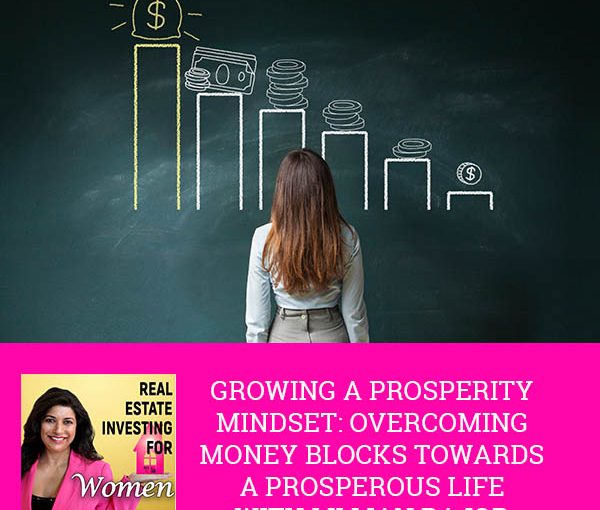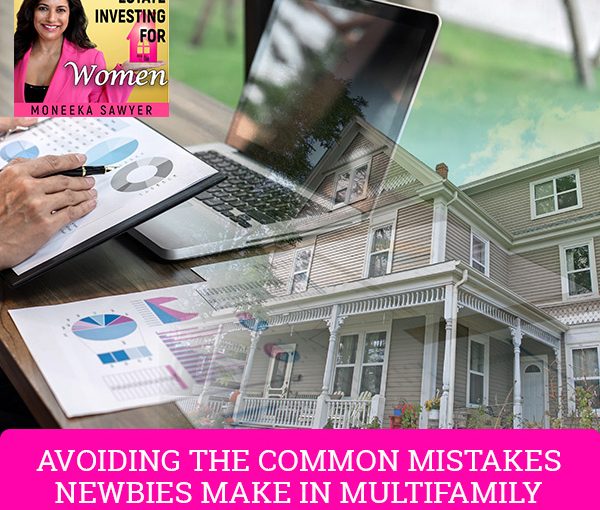Setting Up Your 2025 for Success!
Moneeka Sawyer is often described as one of the most blissful people you will ever meet. She has been investing in Real Estate for over 20 years, so has been through all the different cycles of the market. Still, she has turned $10,000 into over $5,000,000, working only 5-10 hours per MONTH with very little stress.
While building her multi-million dollar business, she has traveled to over 55 countries, dances every single day, supports causes that are important to her, and spends lots of time with her husband of over 20 years.
She is the international best-selling author of the multiple award-winning books “Choose Bliss: The Power and Practice of Joy and Contentment” and “Real Estate Investing for Women: Expert Conversations to Increase Wealth and Happiness the Blissful Way.”
Moneeka has been featured on stages including Carnegie Hall and Nasdaq, radio, podcasts such as Achieve Your Goals with Hal Elrod, and TV stations including ABC, CBS, FOX, and the CW, impacting over 150 million people.
Become the Bank for Passive Real Estate Income – Buy Notes
Moneeka Sawyer is often described as one of the most blissful people you will ever meet. She has been investing in Real Estate for over 20 years, so has been through all the different cycles of the market. Still, she has turned $10,000 into over $5,000,000, working only 5-10 hours per MONTH with very little stress.
While building her multi-million dollar business, she has traveled to over 55 countries, dances every single day, supports causes that are important to her, and spends lots of time with her husband of over 20 years.
She is the international best-selling author of the multiple award-winning books “Choose Bliss: The Power and Practice of Joy and Contentment” and “Real Estate Investing for Women: Expert Conversations to Increase Wealth and Happiness the Blissful Way.”
Moneeka has been featured on stages including Carnegie Hall and Nasdaq, radio, podcasts such as Achieve Your Goals with Hal Elrod, and TV stations including ABC, CBS, FOX, and the CW, impacting over 150 million people.
Growing A Prosperity Mindset: Overcoming Money Blocks Towards A Prosperous Life With Lillian Bajor
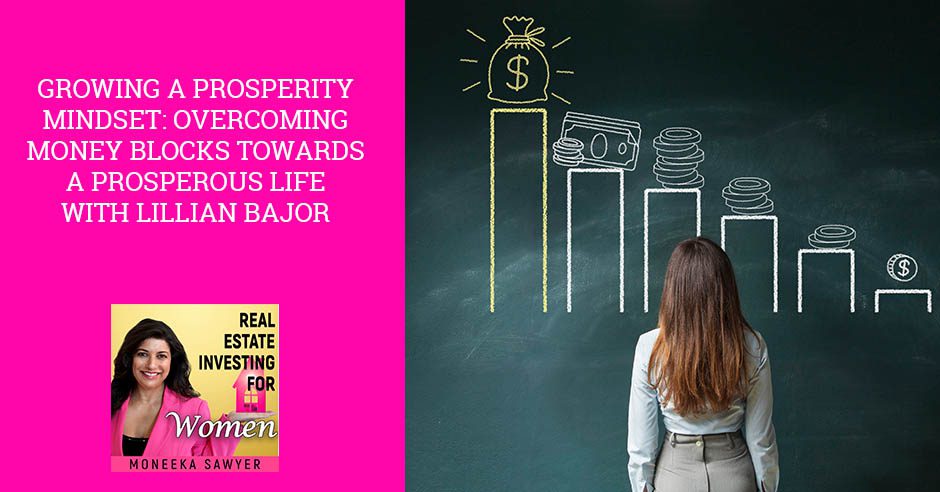
Are you earning but only to some extent and not as much as you should be? Are you stressed due to money concerns? In this episode, Moneeka Sawyer welcomes Lillian Bajor, Owner of Prosperity Coaching and Financial Literacy programs, to dive deep into our Prosperity Mindset, helping us find alignment in our prosperity consciousness to thrive and overcome money challenges. They discuss how the messaging we receive can limit us; therefore, we need to train our minds with affirmations, so we can develop prosperous thoughts and grow our mindset. Lillian then discusses the roles of parents in engaging children with financial literacy, building within them a strong financial foundation as they grow up. Immerse yourself in this conversation and learn more tips on how to change our relationship with money as well as the value of learning about real estate. Open your prosperity mindset today!
—
Watch the episode here
Listen to the podcast here
Growing A Prosperity Mindset: Overcoming Money Blocks Towards A Prosperous Life With Lillian Bajor
Real Estate Investing For Women
I am so excited to welcome to the show our guest Lillian Bajor. She is a personal finance and life coach, minister, and Owner of Prosperity Coaching & Financial Literacy programs. Blending spirituality and money, she helps people overcome their money challenges, blocks, or misconceptions, and open up to prosperity consciousness so they can thrive.
Her comprehensive coaching systems and style stem from overcoming her own financial challenges, plus a strong foundation in business, a solid financial education, as well as in-depth studies and finance through psychology, metaphysics, resilience modalities, body intelligence, and the healing arts. Her company serves the important need for financial literacy. Its mission is to educate and empower women and men with financial confidence and a strong financial foundation. Lillian, thank you for coming to the show.
Thank you so much for having me. It’s a pleasure to be here, Moneeka.
What’s so funny is I’ve had so many conversations with my audience. Frequently, the conversation of spirituality will come up. There seems to be a pull. People seem to feel like they’re against each other. My spirituality has to be in this box. My money has to be in this box. Money can’t contaminate spirituality, which is so fascinating because as Indians, we believe the opposite. Everything in our world is a part of our spirituality, including our wealth or our money or whatever. I find it fascinating how people here tend to rip those two pieces apart. I think both of them are such a big part of who we are. I love that you combined them also. That’s wonderful.
I’m going to be honest with you. It wasn’t intentional. It was the spirit. I was a minister at the time and I decided that I need to get the whole money conversation because I learned a lot about business but not about money. I was determined to master it because I kept having challenges and seeing challenges in my family. I was so grounded spiritually that when I started working with money, they got married because they too had a hard time with money. I was like, “This is too dry. It’s too boring.” It wasn’t when I was able to come into my spirituality and let that be my come from.
I also love that you talked about you had a lot of business expertise but not a lot of money expertise. I think that is going to be a key piece of this conversation because this is what I find out there. I coached CEOs, entrepreneurs, and solopreneurs for 15 to 20 years. One of those things that came up consistently is business and money are not the same things.
Just because you have a brilliant business mind and you make a lot of money, does not mean that you understand money. That’s why many people lose and gain money so fast in their businesses because they love building a business but they don’t understand how money works. It’s fantastic that you understand that those are two separate things and that you got educated on both of those.
Yes. I grew up in a family business. I’ve been working in the family business since I was fourteen after school but it was pleasurable. It was normal and natural. It wasn’t even a chore or anything. It was something me and my sisters did. It was fun. We would hang out. We worked and as I got older, I started working. My father had restaurants. He came to California and he had a wholesale stationery business.
I grew up within the family business and my father was an open book and a very savvy businessman but money was his thing. I ran a whole department, the advertising specialty department of the company. It was a special division, but the money was something he kept his eye on all the time. He didn’t feel at the time that women needed to earn or to know about money. He was from that generation. He didn’t give me the knowledge because he always came from the mindset that women are taken care of. It was something that I later realized that I want this education. I have all this business knowledge, but when it came to money, I didn’t manage my money well. I could spend it but I didn’t manage my money well. I was not financially literate.
That’s a big deal, learning how money works and how to utilize it in the best way in your life. Most people don’t get educated on that, men or women, but less so women than men.
Things are changing now and I’m very grateful and happy about it. I’m sure lots of parents are educating their children and letting them be aware of the whole money conversation. In my generation in the ’50s, women didn’t even work. That was before me, so we’ve come a long way. I was lucky that we had a family business where I received all my business knowledge, but money was a different story back then.
I was born in the ’60s. It was still not something that women were taught at all. I was the oldest of three sisters and I was still very interested in it. I learned a lot from my dad. I would help him write checks and we would talk about bills, taxes, and all of those things that no child wants to learn. Somehow I was interested. It was a way for me to spend time with dad.
However, the other two girls had no knowledge at all. Now, as we’re grown-up women, both my sisters are very smart women, but I’m much more financially adept than the other two because they weren’t interested in the conversation. Some of it is the environment and some of it is an interest. For those ladies that have young children and you want them to be financially literate, it’s important for you to engage them in the conversation because as they grow up, they become more financially literate.
This is another thing that happens. People are like, “You don’t want kids to be thinking about money all the time. Money is not important. Let them be children.” All of those things are true except that money is not important. The reality of life is no money equals homelessness, illness, and all of those other things. Money is a reality in the way that we live. Educating our children, if you want to make it fun or cute or whatever, that’s great. You need to engage them in that conversation because you don’t want to just throw them out into the real world and then have them figure it out. You would like to have them have some foundation around that.
I want to bring up the mindset of people that would think you don’t want children to think about money. Why not? Why would money be that subject that you would put it in a place where it’s like, “Children shouldn’t be exposed to money? Money is not a burden.
It’s not a bad thing.
You teach them to brush their teeth. You teach hygiene, nutrition, exercise, and education. Money is just another part of life. To bring it out of that place where it’s taboo, “Don’t burden children.” That’s what I’m hearing when they say children shouldn’t need to know about money. It’s a part of life.
Children should know about money. Money is not a burden. It is just another part of life. Click To Tweet
I often will give my nephew, my youngest sister’s son, candy money for his birthday. His favorite thing in the whole world is candy. I give him candy money and then we take the candy money, whether it’s $10 or $20, and we go to the candy store. We tell him, “You got this much to spend so you need to figure out what you would like.”
He might spend two hours at the candy store trying to figure out, “I could get this. That’s cool or I could get these three items, they’ll fill my basket more,” or whatever. He’s learning about creating priorities for what’s important to him. He’s learning Math. He adds up every single scent in his head. He’s amazing at Mathematics because of this. He reads all the descriptions on the back so he knows what he’s getting. It’s helping his reading.
He’s learning about money inadvertently. This game has turned into this thing that helped him in school, in Math, reading, and prioritizing when he is trying to do his homework, “What do I prioritize? What’s more important?” If I want to do this game or play the piano, which one is more important? It’s interesting the way that he took a money conversation and turned it into a life-learning lesson. I’m amazingly impressed with that, and the way that it’s changed his outlook on life because his very playful. There’s nothing heavy or burdensome about it, but he’s learning about all of it at the same time.
I think it’s brilliant. It’s learning buying decisions at the age of eight without even knowing that you’re learning something that’s so valuable and important for his life.
Let’s start here by defining prosperity the way that you see it.
This came to me. The prosperity consciousness is being in harmony with the flow of life and being in harmony with our true self. When we’re spiritually aligned, we’re aligned with prosperity. That is the way the universe is. I know you know this. We live in a spiritual universe. We’re not taught that, but we do live in a spiritual universe. Everything is in harmony and balance.
The prosperity consciousness is being in harmony with the flow of life and being in harmony with our true self. When we’re spiritually aligned, we’re aligned with prosperity. Click To Tweet
It’s a perfect ecosystem. We messed with it. We messed it up. We’re experiencing the results of that like oil spills, rainforests, the ozone layer, and all the climate issues we’re having. Before all that, I’m sure when you were young and certainly when I was, things were very much in a lot more harmony and they still are. As humans and spiritual connecting spiritually, it’s being in this consciousness of knowing that you’re taken care of.
It does come from within and I’m speaking of intuition, inspiration, meeting the right people, and being in the right place at the right time, and is lined up with that. That is that prosperity consciousness where your life is in balance and there is fulfillment because there’s alignment to our true nature. We’re being guided from there, and the world is not set up like that because we go to school and everybody was in a cookie-cutter. You’re going to go through life and this is the way it is. Connecting to our natural gifts and talents wasn’t a part of it, but when we move into that consciousness of being inwardly aligned, we’re taken care of and we’re aligned with prosperity.
Talk to me about the prosperity mindset. That’s what prosperity looks like but talk to me about the mindset.
There’s more than one layer. A prosperity mindset is training the mind to think prosperous thoughts. A lot of the languaging and a lot of the messages are limiting us. You can’t do that or you don’t do this. It’s all this language and all this direction of how to live our lives and what to do. A lot of times, we’re being limited but our minds can be trained through affirmations. That’s one step to growing a prosperity mindset.
Another big piece is growth and constantly educating and growing. In our experiences, if we have succeeded in life but we’ve done something good and we’ve had a great day, to give you that and to anchor in what was great about that, and to align with that. How I moved through that day. How I created that. How I participated in that. How did I make it happen? Even though there may have been some bumps and roadblocks in the way that I moved through them, I got to where I needed to be.
That’s part of the prosperity mindset. Another big piece is when there’s a failure and some are bigger than others. I’ve had my fair share when it came to money and that’s why I’m doing the work I do. I was in a lawsuit and I had a bankruptcy. I had all kinds of things. To use those experiences, which can be so difficult to work through and to grow through, but to look at the gain. What is it that I didn’t understand? What did I need to learn? How can I use it for my upliftment? What are the treasures here? I’m big on that.
When I was in school, they called it a golden rung in the ladder and we’re climbing the ladder. It’s like getting a Harvard education. You go to school and you learn all this knowledge, but when you’re out there in the streets, you’re doing it, you’re taking these risks, and it doesn’t work out, then instead of doing a launch and it did not succeed, and then, “I’m never going to do that again.” I did a launch. I didn’t succeed. What did I learn? What can I do differently? Start going into that. That is a prosperity mindset because it’s expanding and it’s looking for upliftment and gain rather than judging or contracting.
What do you think it is that stands in people’s way of experiencing prosperity? I know this idea of contraction is a big piece of that. What causes that?
It’s fear of the unknown. For a lot of people, it stops them and staying in their comfort zone. My life was one where I was kicked out of my comfort zone because of my finance. A lot of it was financial challenges, and that was the impetus of what is pushing me to constantly do the work I’m doing around financial literacy because I’m learning and growing. I am understanding that I need to master this.
For whatever reason, I need to get it. I have business skills. I have a lot and I’ve learned a lot. I’ve had a lot of challenges for a reason. My father had a lot of challenges but it’s that fear and thinking that our mind is finite. It’s like a computer. Many of us know this. Whatever you put into a computer is what you’re going to get out. If you need it to put a certain key or a certain letter in there, if you need it to code it a certain way, you are not going to get in there if you don’t have the password.
Think about that. We need to program our minds. The information we’re getting from our minds is what we’ve learned, what we’ve seen, and the messages we’ve received. It’s been from childhood. We don’t even remember half of them. Some of them are inherited beliefs. I’m not going to say it’s junk, but it’s a lot of material that probably doesn’t serve many of us.
This fear comes in. We don’t even know where it’s from, but it contracts us and stops us from experiencing prosperity. The example I would like to share is my father. He was an incredibly savvy businessman. He came to this country in 1956. He did not speak the language. He spoke Hungarian. My mother and my two older sisters were babies.
He had the courage and the bravery to be like, “I’m going to America.” It was because there was communism and all kinds of things in his country. He was a man that wanted to make a lot of money and he felt very limited. They came to America and he became a multimillionaire. In 1980, at that point, he was incredibly wealthy. He invested in real estate and I don’t know the reason behind that. I don’t recall what that was but I worked with him at the time. There was a brand new building that was built in Englewood on Ivy Street.
The warehouse is where his business was and where I worked. There was another piece of building on the lot. He rented it to Milne Truck Lines. It was quite a large block. He owned that. He owned a property in Palm Springs on Camino Real. It was a gorgeous home. He also owned a property up on Sunset Plaza. It was on Rising Glen. It was a gorgeous home. In 1980, he was growing very fast. He factored his business, a portion of the money, probably more than he should have. I know about the factoring because I remember going to the office. I was young. I was in my early twenties, but he was very much of an open book when it came to business. I was familiar with that.
What is factoring for my ladies that don’t know?
Factoring is you sell your invoice and you get paid upfront a certain percentage because there is a guarantee that the money will be paid. You’re getting the money in advance. It’s a way to grow your business and he didn’t know about that. I think that was something that was new. Whereas if you grow your business and it’s your own money and your own cash, you don’t want to be factoring money. I don’t know what to compare it to actually.
It’s preemptively spending. It’s a little bit like a credit card.
However, it was for business growth. It was the expansion that was happening. The business was booming and then there was the recession. The factor pulled everything. He lost everything. It was a difficult part of life because I was there and I remember it. Everything went crashing down. The part that I remember about my father who has passed away since then is he became a millionaire again, but he did learn in a business where before he was a wholesaler of stationery.
He carried all kinds of office supplies that you see in Office Depot and that you see in these office supplies. He had whiteout, he had copy paper, he had the big pens, crypto pens, pentel, and tons of office supplies. That’s what he did but his business was wholesale. He was selling at a very small margin but in very large quantities. That was his business.
What he did after he went bankrupt was decided that everybody would always need a pen. No matter what, people would always need writing instruments. He became a millionaire again and he did writing instruments. That’s all he did. He expanded into advertising specialty products, which is the division I got to run and grew into.
The thing that I want to highlight is real estate. What I was super surprised at is that he lost all of this money in real estate and he contracted. He went into fear. He didn’t educate himself. The thing with my dad is that when it came to real estate, he didn’t do the same thing. He didn’t use the same prosperity mindset because he had an incredible prosperity mindset, but instead of expanding and educating himself about real estate, he contracted. He moved because he lost the house that he was in that he owned at the time.

Prosperity Mindset: He lost all of this money in real estate, and he contracted. He went into fear. He didn’t educate himself.
We moved into a couple of houses down. He lived on the same street for two decades on Rising Glen but he was renting. I remember that the owner wanted to sell the house and he offered it to my father. My father would not buy it. He was afraid. He totally contracted. He went into a scarcity mindset, and he wound up regretting that because he was accustomed to living on top of a hill and the quality of the air up there. It’s the whole lifestyle. He wound up living in Beverly Hills in a beautiful apartment. It’s huge like a condo that he wouldn’t buy. He paid rent for the rest of his life. He was wealthy and he had the money but he didn’t educate himself about real estate.
I have a question about that. I know this is an interesting thing to say on a real estate show, but real estate is not for everybody. There are some people who it is not the right fit for them, and they still build wealth. We know the numbers. Ninety percent of wealthy people in the world own real estate and many of them have become multimillionaires through their real estate investments. Real estate is a huge part of the portfolio of the very wealthy. However, there is the 10% that’s not true. It sounds like your dad was one of those people.
Real estate is a huge part of the portfolio of the very wealthy. Click To Tweet
I’ve never met anybody that’s like that. Real estate is not for everybody. I get that. It is the one thing that we in America have access to that the government completely supports. It’s a no-brainer way to build wealth because of the way the laws work here in the United States, but not everybody wants to get into it. I can see from your dad, he had this huge real estate empire. He lost that empire because he made some noble but questionable decisions in another business that was supporting real estate.
He then decided he didn’t want to do real estate. When we talked about that, he didn’t get educated, and he didn’t get back into real estate. Did he suffer for those decisions? What do you feel was the opportunity cost may be or the consequence of him not going getting into real estate on his second round when he rebuilt?
It was a very substantial loss. He could do the things he did because he was young and he had this enormous amount of energy, enthusiasm, desire, and ambition. At that age, it was different. He had grandchildren by then. My daughter was born in 1980. He’s an older man. There’s a lot more that plays into it and I think it may have chipped at his sense of empowerment over, “I can do anything.” I can’t. That’s not my arena. I don’t have the knowledge.
For some reason, I don’t know what the block was to get the knowledge. In business, it was almost like an intuitive automatic response. This didn’t work. I’m going to do this and made it happen. It was so quick but in real estate and personally, my takeaway was he didn’t have the knowledge, to begin with, to take that kind of risk.
Why go factor and try to grow the business this fast? You are doing great. I think it was spinning out because sometimes the growth is so quick, and not watching the economy and not knowing in. It’s not having enough education on a broader scale. There’s me, my life, and my business. What’s going on with the planet? What’s going on globally? What’s going on in the world? Am I watching the trends? It’s like having a more expansive point of view rather than just, “This is my world. This is what I’m doing.”
For the ladies, I hope you enjoyed that. The reason that I wanted to dive deep into that is because we do see very successful people that have these fear responses to perceived failure. He lost everything in real estate and decided, “I’m not touching that again. I don’t know enough and I don’t want to learn enough. I’m done.” I think that this can happen.
We’ve had so many people on my show who lost everything in 2008 or had huge failures because of bankruptcies, medical bills, and all sorts of stuff, or a child that needed help or had a birth defect. There are many people that have built up these amazing real estate businesses, and then they completely collapsed underneath them. The people that come on my show are usually the people that pick themselves back up and made it work again.
I never get a story on this show of someone that said, “Nope, I’m done,” and experienced a lot of success in a different way. However, there’s a perception in the family, or at least in his daughter that there was a loss there that happened because he wasn’t resilient around that business. I don’t know that I got a full understanding of what happened. There’s no way to know in such a short conversation. What I do want to know and what I do want my ladies to hear is that this happens to the very best of us, and it does not need to be the end.
When you watched your dad and it was the end for him, it has inspired you now to pursue education around that and to help teach others around that so that they don’t make the same mistakes. Even though this mistake didn’t cost your dad his lifestyle or his happiness or necessarily his self-confidence, it cost him something that you are sensitive to, and that you don’t want other people to experience.
A lot of that is not living in fear. You want people to be free from that fear monster so that they can live in all the different kinds of prosperity that we have like financial prosperity, health prosperity, feeling and alignment, and joy. The prosperity of joy, which I call bliss. All of those things are important to people like you and me. Maybe that was a piece of the loss, but it doesn’t sound like it was much bigger than we can pin down in a show.
I wanted people to hear this conversation because they don’t hear it here. I wanted people to understand that I do get it. Sometimes it’s hard and sometimes things fall apart. At that moment, you choose or in that timeframe. It may not be a moment. It may be a moment or a phase of your life, and you choose what are you going to do with that. It’s what you were talking about. Are you going to learn? Are you going to expand? Are you going to grow? Are you going to contract? Is fear going to start controlling your life in a certain way that doesn’t serve you?
I think there are a lot of factors and I do love this conversation because it’s who you are and who I am. We’re the next generation. He’s also of a different generation. He has done a lot. There’s a lot here. We could probably enjoy going much deeper and getting a lot more insight, but it did change his personality. What I love is that it changed me too. When I look at financial literacy, it’s hardcore all-money topics. I go wide on all money topics. I call that financial literacy.
I realize and I think this is part of why I naturally go there. It’s because I also have a background in healing. You want to go wide. You want to understand money because if you’re going to be making money, you’re going to wind up wanting to buy real estate or a condo or something. You’re going to then need to know about other conversations around money, mutual funds, or having investments. It’s this deep and wide knowledge of money. When things happen because they will and they do, you can take it in strides.

Prosperity Mindset: If you’re going to be making money, you’re going to wind up wanting to buy real estate or a condo or something. You’re going to then need to know about other conversations around money.
Also, be resilient. Bliss is about emotional resilience. Emotional resilience happens in partnership with resilience in all areas of your life. Your emotional resilience leads to resilience elsewhere, but that resilience elsewhere has to be a priority. In other words, you can’t just say everything is fine because it’s fine inside of you. That’s the single most important thing. However, if you want your life to work, you need to be resilient in the entire spectrum of what you’re paying attention to or what’s important to you.
The whole idea of being resilient is what bliss is all about. It is being able to come back to this place of balance. Balance isn’t my favorite word. I call it equilibrium. You come back to this place of emotional joy where then you can look out into your world and be resilient in everything else that you’re doing. Even if things are crashing down around you, you can now be resilient and bring them back to a place that serves the joy in your life.
I’m going to bring this up because what I’m hearing you say that I love, but it’s also that inner alignment to prosperity. Here’s what’s evolved for me. It’s the inner alignment with prosperity, regardless of what’s happening on the external. Keep going deeper into that and letting that be well that is nurtured and cultivated. I do the work every day because things are changing constantly. I’m working with people. I’m living in a world. I’m out there. I’m participating fully. I’m realigning always on a deal.

Prosperity Mindset: Keep going deeper into that inner alignment with prosperity and nurture and cultivate that.
Sometimes a couple or more times a day, I’m realigning myself even during this conversation because I’m talking about a lot of loss that I experienced, lived through, and was a part of. There was incredible wealth after that. I was there for the cycle. Thank God that I got to see the wave of it. It came right back. He made it last but he did contract as a personality.
He contracted as a personality. It didn’t feel to me like his confidence because he exuded that, but it did do something. I don’t have the word for that right now. It will probably come up for me. I love that you went onto a deep dive and maybe it will trigger something in the audience and they will all have their own a-ha from it.
I hope so. I know that I was simplifying it a little bit and I didn’t mean to be disrespectful in any way, but I was trying to get there, “What was that thing?” Sometimes we can’t pinpoint it. It’s just that something changed.
For him, what I’ll tell you is he contracted. I didn’t want to say this, but I’m going to say it. He lived like he was immortal. He could do anything. Nothing could hurt him. That’s the way he lived his life. That’s the way he took these huge risks and kept bouncing back. I think that loss chinked his armor and that he’s not immortal.
It made him mortal.
It made him feel mortal. It’s like, “Holy cow. Something can really ouch.” He didn’t show it so I can’t share. He was the kind of guy that didn’t show it.
This conversation has been amazing. I know there was some stuff we didn’t cover and we’re also out of time so we can’t do the three rapid-fire questions, but I love the conversation. I know you. I know our spirits are connected so I wanted to do a deep dive into that and I hope that was okay. Thank you so much for being vulnerable with me and talking through that. I super appreciate that.
It was a pleasure. I enjoyed it too. I’m used to going deep and I like it.
You’ve been amazing. I’m sure my ladies are going to want to know how to get in touch with you. Talk to us a little bit about that. How can my ladies get more?
I would love to connect with whoever would like to find out more about my work and what I do. My website is LillianBajor.com. You’re welcome. Thank you so much for having me on your show.
Ladies, Lillian has offered for EXTRA to do a meditation with us that’s about inviting prosperity into your life. She’s going to guide us through that in EXTRA. Stay tuned. If you are subscribed to EXTRA, we got more. If you’re not, go to RealEstateInvestingForWomenEXTRA.com and you can sign up there. For those of you that are leaving Lillian and me now, thank you so much for joining in this conversation. I look forward to seeing you next time. Until then, remember that goals without action are just dreams. Get out there, take action, and create the life your heart deeply desires. I’ll talk to you soon. Bye.
Important Links
Love the show? Subscribe, rate, review, and share!
Join the Real Estate Investing for Women Community today:
Get Dr. Shaler’s free EBook: “How to Spot a Hijackal” at https://www.forrelationshiphelp.com/help-handling-hijackals-spot-signup/
To listen to the EXTRA portion of this show go to RealEstateInvestingForWomenExtra.com
——————————————————
Learn how to create a consistent income stream by only working 5 hours a month the Blissful Investor Way.
Grab my FREE guide at http://www.BlissfulInvestor.com
Moneeka Sawyer is often described as one of the most blissful people you will ever meet. She has been investing in Real Estate for over 20 years, so has been through all the different cycles of the market. Still, she has turned $10,000 into over $5,000,000, working only 5-10 hours per MONTH with very little stress.
While building her multi-million dollar business, she has traveled to over 55 countries, dances every single day, supports causes that are important to her, and spends lots of time with her husband of over 20 years.
She is the international best-selling author of the multiple award-winning books “Choose Bliss: The Power and Practice of Joy and Contentment” and “Real Estate Investing for Women: Expert Conversations to Increase Wealth and Happiness the Blissful Way.”
Moneeka has been featured on stages including Carnegie Hall and Nasdaq, radio, podcasts such as Achieve Your Goals with Hal Elrod, and TV stations including ABC, CBS, FOX, and the CW, impacting over 150 million people.
Avoiding The Common Mistakes Newbies Make In Multifamily With Taylor Loht
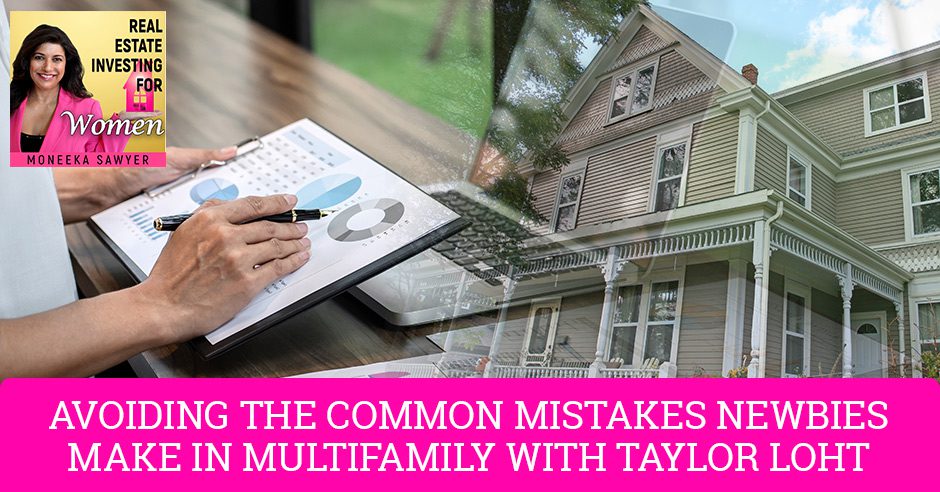
Newbies in real estate tend to make mistakes in a lot of things. Although mistakes are possible, we can still correct them. What could these mistakes be? In this episode, Moneeka Sawyer welcomes Taylor Loht, host of the Passive Wealth Strategy Show, to discuss the common mistakes in multifamily you should avoid to help you build wealth. Inaction is the most common mistake newbies commit, but when you take action and commit to the process, the result of your efforts can be fruitful. Cultivate discipline in your life and move forward as you build wealth. Want to learn more? Tune up the volume and tune in to this conversation now.
—
Watch the episode here
Listen to the podcast here
Avoiding The Common Mistakes Newbies Make In Multifamily With Taylor Loht
Real Estate Investing For Women
I am so excited to welcome to the show Taylor Loht. I had the pleasure of meeting Taylor. I was on his show. He was such a pleasure to talk to so I wanted to share him with you ladies. Taylor is a multifamily and self-storage real estate investor. He has acquired, partnered on, or had a hand in over $150 million in commercial real estate. He hosts the Passive Wealth Strategy Show, which I was on, which helps listeners escape the Wall Street casino and build wealth on Main Street by investing in real estate while avoiding the common newbie pitfalls. Taylor, it is so good to see you again. Welcome to the show.
It’s great to see you as well. Thanks for having me.
Could you give us a high-level version of what brought you to real estate? Give us your story.
I’ve done a lot of thinking about this and trying to be more self-aware of what happened and occurred. In 2015, I had been investing in Wall Street’s stuff for a while and doing pretty well because I got lucky when I started making money and we were in the market. 2015 brought new things. The price of oil fell from $110 or $120 a barrel down to $40 something over the course of that year. It took with it a lot of the stock market. We had a lot of stagnation and that got me questioning. I was like, “Maybe this isn’t the right way to build wealth in the long run.”
At that same time, I so happened to read Rich Dad Poor Dad. All those things factored in together and joined together and got me thinking there’s got to be a better way to build wealth. I started learning about real estate and hit the ground running I suppose. I was going to go get MBA and decided not to do that after reading Rich Dad Poor Dad and started investing in real estate. That’s the quick version.
Your story is so similar to mine. I got my degree, thought about getting an MBA, and decided instead to take that money and invest in real estate.
It’s tough to look at the MBA and think between the salary that I’m not earning and the cost to get the MBA. It’s going to cost me $300,000 to $400,000 to do this and then I’m going to have a big pile of debt and a job I don’t think I want to make more money. That didn’t feel right. Robert Kiyosaki showed me that my misgivings about that were right and I had to go another direction.
How long have you been investing in real estate?
I started investing in 2016 as a passive investor with the goal of getting more active in the space, scaling and growing. For me, it’s a little bit of a hockey stick type of thing. I’m a very introverted type of person naturally. You mentioned getting your first degree. My first degree is in Chemical Engineering. I’m a nerd. I didn’t spend my teens and twenties getting out there and socializing. I had friends and stuff, but I wasn’t like a big man on campus.
I had to go learn how to meet people at real estate networking events. I had to learn how to do things like what we’re doing now, doing a show, and speaking to all your awesome readers because this is not the type of thing that I naturally gravitate toward, but to get to where I wanted to go in life, I had to learn how to do these things. I had to learn how to build a level of comfort and confidence doing these things. That took time, but that’s okay as long as you’re working and moving forward then there’s nothing wrong with that.
I’m with you. What is the biggest newbie mistake real estate investors make? Where do they go wrong?
When we’re talking about people who are new, they say may start going to real estate networking events and trying to figure out what’s out there and all these kinds of things, the biggest mistake is not taking action. Parenthetically thinking that education equals action. Education is great. I’ve spent a lot of money on real estate education more than I ever thought I would, but you have to turn that education into action. This includes me at the beginning because you don’t know exactly what to do when you’re getting started, so you don’t know which direction to go. You’re getting pulled by shiny objects or can’t pick a path and stick to it.
You have to turn that education into action and commit to the process. Share on XWhen new real estate investors want to get started, they don’t know where to start. Maybe they go to a networking event, or they hear about a course that’s going great. Maybe they buy it or don’t, but either way, if they buy it, they might not stick to that. That might not hold them down the road. They might go buy the next program and then eventually give up because it doesn’t work. They might try for a month and then they don’t get a deal for a month. It took me years to get my first deal of continually working at it and growing. It’s taking action and committing to the process. Stumbling and falling on your face sometimes is part of the process. It’s something that most of us deal with at the beginning.
It is interesting because one of the real big tenets of this show is to take action. What I shared with one of my guests is to take mindful action. For me, action is about doing something. Education is an action, but you do have to go to the next step. Also, don’t get analysis paralysis. Go to that next step, commit to a strategy, and move forward towards actions toward that strategy. It’s all action, but it’s a matter of not getting stuck in any particular action either because there are other things.
For instance, if you want to do no money-down strategies, you’re looking for lease options and calling distressed sellers. Don’t get so caught up in the phone calls that you don’t close any deals. That’s also getting stuck. What happens is people buy a course and they’re like, “I’m going to learn all of these scripts by heart.” You have to make phone calls. When someone says, “Yes,” you have to follow up. Don’t like freak out and say, “I’m not going to call them back.” There are baby steps in that process. It starts with education, but then you got to keep moving forward.
Speaking of being on the phone with people, you have to get to the point where somebody yells at you and calls you a jerk because you’re trying to do this deal with them, and for whatever reason, it’s going to happen. I got over it. I’ve been yelled out of the phone by people a few times whose property I’m trying to buy, but it gives me pause. I’m a sensitive guy, but you got to make the next calls and move on to the next one and whatever those hurdles are that we have to get over.
I’m never going to poo-poo education. You have to apply it. Maybe you learn about wholesaling and you’re like, “I don’t want to be a real estate wholesaler.” I don’t want to be a real estate wholesaler either. There’s nothing wrong with being a wholesaler, but if that’s not your path, no problem. Find the path that is right for you, commit to it, and move forward.
How do you overcome the key limiting beliefs of new investors?
Do you mean on an individual level like my own limiting beliefs?
Yes.
My opinion is that’s a daily practice. That’s something that we, as individuals, have to work on. I’m realizing that 2015 was a very pivotable year for me. I had that shift in my way that I built wealth, but also, I started training in Brazilian jiujitsu and I still do at the end of 2022. I became a vegetarian in 2015 and I’m still a vegetarian. I’m marrying a vegan in 2023. I’m stuck on that path too. I’m perfectly happy with it.
In this realm, you have to constantly be challenging yourself in taking that next step. If you’d asked me in 2015 when I was brand new at jiujitsu and didn’t know anything, “Are you going to stick with it? Are you going to get to purple belt level?” which I am now, I would’ve said, “I’m not so sure,” because I had those limiting beliefs in my mind. Now, if you asked me if I’m going to keep progressing, absolutely. As long as I don’t get injured and can keep going and training, I’m going to keep pushing forward, but it’s only because I’ve continued to press through all of those various beliefs.
Now, I work with a lot of passive investors. The first couple of phone calls for example that I had with passive investors scared me, but you have to do it. There’s always the first one, whatever it is, like the first offer that you make, the first property you get under contract or the first investor who wires you money. “I have $100,000 of this guy’s money and I have to put that money ahead of my own. That’s scary,” but that first one is what gets you going and starts the fire.
If you’re familiar with this thing going around called 75 Hard and I don’t know if your readers have heard of that, but it’s put out by this guy named Andy Frisella. It’s about cultivating discipline in your own life. There are a few things that you’re required to do every day for 75 days. You’re required to follow a diet. He doesn’t tell you what one to follow. He says, “You got to pick it and stick to it.” You have to exercise twice a day. One of those exercises or workouts has to be outside. You have to drink a gallon of water a day.
There are a few other things you have to do. You have to take a cold shower every day for five minutes. I don’t like cold showers. The rest of the stuff I can handle. I still hate the cold showers. You also can’t drink if you like alcohol. I like whiskey but I’m not drinking it because I’m sticking to the program. If you miss one thing, you got to start back again on day one.
You also have to take a picture of yourself shirtless every day for 75 days. Those pictures of me are never going to see the light of day. My fiancé doesn’t see them. They’re only for me. I tried this program and I made it probably 3 or 4 days. I’m not sure exactly what I missed. Maybe it was a culture shower or something else, but I had a limiting belief when I got started about whether I could accomplish it.
I’m not at the end of the program now. The jury is out. I haven’t completed it, but I’m significantly further than I got last time. I didn’t have this same level of limiting beliefs about whether I could stick to my diet or work out twice a day and one of them outside. It’s hard to fit this stuff into your schedule. That’s a lot of time. The cold showers stink, but I can get it done and just don’t enjoy it.
It comes down to putting one foot in front of the other. If and when you “fail,” or if you don’t meet your own expectations which are most of the time because you didn’t take the right actions. We knew it at the time like you have an email to respond to from somebody or a call from a potential seller and you’re putting off calling them back. You need to take that action. Even if this deal that you’re working on doesn’t go anywhere, you need to have that process in your mind that mentality or mindset of, “I’m going to take the action on whatever this thing is,” and it comes down to cultivating that in your life as much as you can.
I love your whole attitude about possible failure. I like to call it more like trial and error rather than failure because failure feels bad. A lot of people are like, “Try is such a weak word like I’m going to try.” I don’t mean it that way. What I do mean is we set a goal and if we are not able to get to the very end of that goal to reach it, examining along the way with this beginner’s mind or gamer’s mind maybe what was it that I did wrong, was not committed to, or didn’t do right? How can I get better at this? I love the fact that you brought in something so personal because that’s where we practice. In business, we feel like the stakes are so high and they’re not higher than personal development.
For personal development, the results are significantly more impactful in your life but they don’t feel as scary necessarily as in business. I love that you’re practicing this ability to create goals, pursue those goals, reexamine where the errors happened, and pursue them again. There’s no real failure. There’s just evolution and success. I love the way that you did that.
We then can take those skills and move them into our business practices. When we’re on the phone with somebody else or taking somebody else’s money, it’s scarier, but you’ve started to develop that skillset required for having that gamer’s mind. “What is this adventure going to bring? How can I become a better person? How can I do this better?” I love the approach that you explained. We’ve never had anybody talk about this deep personal goal setting journey the way you did.
I’m glad to share what I’ve learned. I’ll be honest. I don’t mean to put myself as somebody who is super disciplined all the time. I’ll give you an example. I got injured in jiujitsu. I broke a couple of ribs or maybe severely dislocated them. I had a pretty bad rib injury. If you get a rib injury, you can’t breathe, pick stuff up, and do jiujitsu. I ended up taking a few months off of not training. When you have a rib injury, you can’t do anything. You can’t lift weights.
Eventually, I started doing some jump rope outside and trying to keep my cardio going, but it was hard. I was sitting around and can’t do my favorite thing, which is exercise in any way. My diet and mindset slipped a bit. I put on a little bit of weight. It’s only 5 or 6 pounds and I got it off now. I see life as a process of learning and continuously developing, and then seeing we’ve stumbled and trying to get ourselves back on track, not all at once, but day by day. “What are the steps that I can take to get myself back on the path where I want to be with whatever our goals in life are?”
That’s how life needs to work in order to be fulfilled and consistently learn, grow, and recognize that we’re not always going to perform to our best expectations. Things are going to come up in life, but when we can recognize that and say, “I’m not performing as well as I can. How can I get myself back on track?” That’s what it takes to grow over the long term and build wealth but grow as a person as well, which is more important.
We can mitigate risk as much as we can, but there’s always risk involved in putting yourself out there. People say that public speaking is one of most people’s most feared activities. You’re more afraid of public speaking than you are of dying. Jerry Seinfeld has a good joke about this. You’d rather be the guy in the casket than the one giving the eulogy. That’s not something that I want to do.
When I was a kid growing up and I had to speak in front of the class, I hated it. I didn’t even get any joy out of that, but to get where I want to be, I have to learn how to work through that. Truthfully, I don’t enjoy it but it’s “easier.” It’s less mentally taxing when you can focus on providing value to the audience. My method when I have to do public speaking is to practice until I’m not worried about what I’m going to say and that’s focused on providing value to the audience. The process is getting over our fears progressively. However, it applies to our real estate investing. It’s just huge. Fear is a limiting belief. I’m dealing with them.
You mentioned that you’re an introvert and that you’ve had to develop skills to have that not be negative. I am an introvert too. Nobody ever believes me when I say that, but I’m not a very outgoing person. I was at a big real estate event down in Southern California and I realized there were so many missed opportunities there because I sat with my friends whom I wanted to connect with. That, to me, is what fills me up. It’s these real conversations with people that I care about and want to get to know more. I’m not the person that’s a good networker so there were so many missed opportunities.
However, it was the thing that made it even possible for me to be there because I decided I was going to meet 2 or 3 new people and the people that I was going there with I didn’t know them well so I could build those relationships deeper. I’m all about deep relationships. I am not the best networker and I do terrible in groups. If I’m in a room of a lot of people, I completely shrivel up. Those are characteristics of an introvert and it has never held me back. I’d love to hear your perspective on that because you’re the same way. We don’t hear a lot of that in this real estate world, right?
That’s true. We don’t hear people talking about it because, in many ways, people perceive it. This is maybe changing society, but people perceive introversion as being antisocial or generally less good at business or an investor because you don’t get energy out of networking with 50 people at a networking event. I don’t particularly enjoy that myself, but if you can focus on what you are good at and sometimes you have to do things that you don’t like to do. That’s true, at least for me.
Sometimes you got to get out there, network, and deal with it in your own way or whatever makes sense for you. For myself, if I am at a real estate networking event, particularly a big conference, after talking and trying to build connections with people, I have to step away for a little while and take 5, 10, 15 minutes, or however long to get myself back centered and trying to regain some energy whatever it is. I got to check out for a few minutes. Maybe I’ll take some time to digitize some business cards or be productive with that time checked away so that I can come back to the event with the energy that I need to have. I’m not going to be there forever. These events are typically 2 days or sometimes 3 days. I can deal with it for that long.
Sometimes you got to get out there, network, and deal with it in your own way or whatever makes sense for you. Share on XMy fiancé and I have known each other for a few years before we went on our first date. We met in jiujitsu. She started not too long after I did. We knew each other at the name level. That’s how I pretty much used to know everybody at jiujitsu. I’ve changed that over time as I’ve worked this muscle of building connections with people and I’ve seen that as a valuable muscle. It’s great to get to know people. Years ago, we went on our first date. She asked me out and we connected. We learned how much we have in common and get to know each other on a deeper level.
It went from there. We’re great and very happy, but at that point, we’d probably known each other for a few years where we’d seen each other 3 or 4 times a week for years, but my natural tendency is not to strike up conversations, especially with women at the gym. That’s not who I am. Again, she asked me out. I wasn’t asking about women at the gym. That’s my natural tendency. I’m not there to meet people. I’m there to exercise and get to know this sport. Now, I see the value in the real estate world when I’m there. That’s how I’ve built a lot of connections with many of my investors.
What I’m getting at is that we can succeed in real estate too. There’s more understanding of that and growth in the culture. There are more knowledge bases and strategies out there available to learn from. There are quite a few very good guides for introverted real estate investors to build connections at real estate networking events that are out there.
I’ve had one gentleman in particular on my show in the past that trains introverts on how to succeed in networking and sales with an angle into real estate investing. His name is Matthew Pollard. I got to recommend checking out his content. I’ve got a few of his books on my phone, but suffice it to say that it can be done for those of us who are introverts. We just have to use strategies that work for us in whatever our particular real estate investing niche is. You can find a way.
One of the things about creating a blissful real estate business is to build that business based on your strengths and who you are rather than trying to fight who you are and try to be something that you’re not and build a business on that because it’s not sustainable. We do grow, but you don’t want it to be so painful that it stops you.
I say frequently on this show, there are 1 million ways to make $1 million dollars in real estate and pick one that’s aligned with your strengths, and it’s not dependent on the things that you’re weak on. If I’m weak in networking, I don’t want to build a business that’s completely dependent on networking. It doesn’t mean that I shouldn’t grow that skill, I shouldn’t network, or I shouldn’t push myself, but I don’t want my business to be completely dependent on that until I build some confidence there.
Build a different business, at least to start, and it’s possible. There are so many ways to make money in real estate being an introvert. You don’t have to be what people perceive as what real estate success looks like. I love having this conversation because many of my readers must be introverts and think, “I can’t network,” but you can. It’ll be a skill that you need to develop, but you don’t have to start your business and be completely dependent on that. Pick something else. There are many different strategies.
I totally agree. We can do it. You need to find the route that works for you, build, and learn over time.

Common Mistakes In Multifamily: You need to find the route that works for you, build, and learn over time.
Taylor, could you tell everybody how they can reach you? I know you’ve got an awesome free gift.
My show, Passive Wealth Strategy Show which you’ve been on, and thank you for coming on, is where we teach our listeners how to escape the Wall Street casino and build wealth on Main Street by investing in real estate. We have new episodes every Monday, Tuesday, and Thursday. We also have a free video course on red flags in Passive Real Estate Investing. I invest and do multifamily and self-storage syndications and actively raise money for these deals from passive investors.
I get a lot of questions from passive investors about good things to look for in a syndication. We made the video course of seven things that I’ve seen go wrong in many deals across the board. You spend enough time networking and getting to know people one-on-one in private non-recorded conversations, people will tell you so much. You ask them and let them run. They’ll tell you so much about what went wrong with their deals. When you spend several years in the business as I’ve had and hopefully many more, you start to see some trends and things that can go wrong. You can get that course at PassiveRealEstateCourse.com. It’s totally free. My company is NT Capital at NTCapitalGroup.com. You can look us up there as well.
I am intrigued by the idea of the red flags. You said that there are seven, could we do a deep dive for maybe 1 or 2 on what you’ve learned about them in EXTRA? Would that work for you?
That would be great.
We’ll do a deep dive into 1 or 2 red flags that you should be looking for when you’re looking at investing with a syndicator. I want to highlight that Taylor is a syndicator. He is looking for investors. If you like what he has to say, reach out to him regarding that also. Taylor, are you ready for our three rapid-fire questions?
Let’s go.
Give us one super tip for getting started in real estate investing.
Know your why. Why are you here? What are you committed to achieving? Not, “I want to go buy real estate. I want to go build cashflow.” Those are great and we’ll get there, but start with the deep reason you’re here. Is it that you want to create a retirement for yourself or fuel your own retirement? Is that you want to send your kids to college? Is that you want to be prepared as your parents get older and have the finances to make sure you can take care of them? Whatever it is for you or you want to travel more.
I’m not here to tell you what your goal should be, I’m here to tell you that you should know what it is because it’s going to help push you through tough times. When you get on the phone with somebody and they don’t want to talk to you telling you how much of a jerk you are, that why is going to help you make the next phone call.
What is one strategy for being successful as a real estate investor?
It comes down to every day. A lot of people talk about having morning practice in your life. It’s every day thinking about your goals. Honestly, one of the best tools that I got from a coach who I paid a lot of money to give me this tool, but this is a free thing you can find on YouTube. Go look up Earl Nightingale’s The Strangest Secret. It’s awesome. I listen to it all the time over and over again. It comes down to our lives and experiences. Our success is shaped by the thoughts in our heads.
Are we having positive thoughts? Are we having negative thoughts? If we always focus on the bad things, then we’re only going to notice the bad things and the negative. If we focus on the positive, the good things, the opportunity, and what we can go out and achieve, then we’re more likely going to go do it and achieve those things. I recommend looking that up and listening to it.

Common Mistakes In Multifamily: The thoughts in our heads shape our success. If we focus on the positive, the good things, the opportunity, and what we can go out and achieve, then we’re more likely to do it and achieve those.
What is one daily practice that you do that you would say contributes to your personal success?
For several years, I’ve done intermittent fasting every day. I’ll be honest, it’s come and gone in my life as life gets in the way sometimes. Here and there, I fall off the track, whenever something happens. I’ve been sticking with 16/8, so that’s 16 hours I don’t eat anything, but I drink coffee and water and I only eat meals 8 hours a day. I’m not here to say that’s right for anybody else, but there’s something to it that helps me focus on my goals.
I did a phase where I was eating one meal a day after I get home from jiujitsu. I hadn’t eaten anything for 22 to 23 hours. I go do an hour of jiujitsu, get home, and be so hungry, but the first meal was so good. I wouldn’t necessarily recommend that. I’m not doing that right now, but thinking about that every day helps me eat healthily. As I said, I’m a vegetarian, but there’s a lot of crappy vegetarian food out there just because I’m a vegetarian doesn’t mean I only eat vegetables. I don’t all the time, but doing that every day helps me. Plus, I’m in my 30s. I’m getting older.
I also like listening to Tony Robbins. Somebody who’s healthy has 1 million goals. Somebody who’s unhealthy, sick, or has few months left to live, they have one goal. If we can focus on keeping ourselves healthy, we can keep going after those million goals. As I said, I’m in my 30s. My grandfather who I’m told I’m the spitting resemblance of and whom never got to meet died in his 50s. I’m thinking, “If I’m following his track, that means I’m over halfway done. I got to take care of myself.” I’m sticking with it, but that’s super important. It all starts with taking care of your body.
If we can focus on keeping ourselves healthy, we can keep going after those million goals. Share on XI love that. Thank you for all that you’ve offered on this portion of the show, Taylor.
Thank you for having me.
Ladies, stay tuned. We’re going to be talking about passive investing red flags in EXTRA. If you are subscribed to EXTRA, stay tuned. If you’re not, go to RealEstateInvestingForWomenEXTRA.com and you can sign up there. For those of you that are leaving Taylor and I, thank you so much for joining us for this portion of the show. I look forward to seeing you next time and until then, remember, goals without action are dreams. Get out there, take action, and create the life your heart deeply desires. I’ll see you soon.
Important Links
- Passive Wealth Strategy Show
- Rich Dad Poor Dad
- 75 Hard
- Matthew Pollard – Past Episode of Passive Wealth Strategy Show
- PassiveRealEstateCourse.com
- NTCapitalGroup.com
- RealEstateInvestingForWomenEXTRA.com
——————————————————
To listen to the EXTRA portion of this show go to RealEstateInvestingForWomenExtra.com
Learn how to create a consistent income stream by only working 5 hours a month the Blissful Investor Way.
Grab my FREE guide at http://www.BlissfulInvestor.com
Moneeka Sawyer is often described as one of the most blissful people you will ever meet. She has been investing in Real Estate for over 20 years, so has been through all the different cycles of the market. Still, she has turned $10,000 into over $5,000,000, working only 5-10 hours per MONTH with very little stress.
While building her multi-million dollar business, she has traveled to over 55 countries, dances every single day, supports causes that are important to her, and spends lots of time with her husband of over 20 years.
She is the international best-selling author of the multiple award-winning books “Choose Bliss: The Power and Practice of Joy and Contentment” and “Real Estate Investing for Women: Expert Conversations to Increase Wealth and Happiness the Blissful Way.”
Moneeka has been featured on stages including Carnegie Hall and Nasdaq, radio, podcasts such as Achieve Your Goals with Hal Elrod, and TV stations including ABC, CBS, FOX, and the CW, impacting over 150 million people.
Why The Right Syndicator Believes In Education With Pili Yarusi – Real Estate Women

A syndicator could make or break your real estate career. Many consider them the person in charge of your success. That is why before diving deep into the game, you need to arm yourself with the right syndicator. In this episode, we welcome back to the show Pili Yarusi. Pili is a syndicator herself and is the Cofounder and Operator of Yarusi Holdings LLC. She speaks for the second time on the show with Moneeka Sawyer to share great tips on finding the right syndicator for you. Pili takes us across her journey and offers insights on the importance of education and taking mindful action. At the end of the day, this is your investing journey. You need to protect it as much as you can. Begin by choosing the right people who can help you towards success. Join Pili as she guides you how.
—
Watch the episode here
Listen to the podcast here
Why The Right Syndicator Believes In Education With Pili Yarusi – Real Estate Women
Real Estate Investing For Women
I am so excited to welcome back to our show, Pili Yarusi. I had her on the show a couple of years ago. We had an amazing conversation. You should go back, look her up, and check out that one. I’m so excited to have the next conversation and share with you all the ways that she’s grown and all the new things that she has to bring to the conversation. I’m super excited about this conversation.
Before we head into that, let me reintroduce you to Pili. Pili is a loving mom and wife whose goal is to lead with Aloha by example. Pili is a Cofounder and Operator of Yarusi Holdings LLC with her husband Jason. Yarusi Holdings is a multifamily investment firm that repositions underperforming properties through operational efficiencies, rebranding and value add renovations.
Pili and Jason have managed the successful and profitable exit of these multifamily properties. The Yarusis have an active real estate portfolio of over $100 million. She co-hosts Multifamily Live, The Jason and Pili Project, MOM – Moms of Multifamily and MORE – Moms of Real Estate. All can be found on Facebook, YouTube and anywhere you tune in to shows.
—
Pili, welcome back to the show. How are you?
I’m so good. Thank you so much for having me back on. That was so many moons ago. We were giggling about how amazing it is that we laid the foundations for the people that we become with the things that we read and the things that we do years ago.
Through COVID, you moved locations. You were active on Clubhouse. I’ve been watching all your events on social media. It has been amazing to watch you grow and then to hear in your bio all the numbers and how things are so different than they were years ago. Congratulations. You’ve done an amazing job.
Thank you so much. It was interesting to hear you read some of our old numbers when we were starting, like our triple-digit units. You said we had 100 and something units.
Ladies, we were reading over her bio first. It was the old bio from years ago. It was 426 units and 100 and something in direct management. Look at those new numbers.
We’re at $200 million in assets in direct management and over 2,000 units. We took down our first building in 2017 and here it is. It’s almost 2023. It’s been an amazing ride. It’s been so much fun.
Take us through your journey a little bit. You’re a syndicator. We have a lot of syndicators that come on this show. I’d like to hear about your journey. For me, one of the things that I want to chat about on this show is I feel like my ladies have heard a lot about syndication. We’ve highlighted some amazing syndicators like yourself. Some are amazing and some, I don’t know enough about to say.
My ladies know that the syndicator or the person in charge is the single most important indicator of success. The ladies have had a little bit of a challenge as far as making a move toward investing in these syndications. I’m not sure if you’ve dealt with that, what your experiences have been around that and what advice you can give the ladies. That’s where I wanted to head. Let’s start by reminding us of your story and telling us about the journey over the last few years.
I want to answer both questions at the same time. I’m going to start with something that you and your ladies can think about. For a syndicator, my most important job and this is per the SEC Regulations or the Securities and Exchange Commission, I need to make sure you’re educated. That’s my biggest concern. My second biggest concern is that I need to make sure that you know me and that I know you.
It doesn’t surprise me, honestly, that it’s such a big leap. Number one, you need to get educated about this new asset class. It’s something that you keep on hearing about but haven’t dove into because it takes a little bit of education to dive into correctly. We talk about passive investing all the time. A true passive investor knows what they’re getting into first and understands it.
When it comes to real estate syndication and going in with a syndicator like myself, I want you to know me. I want you to have access to me. I want you to know that I am going to take care of your investment as far and as much as I can. Those are some of the things that I want you to chew on as I’m going through my story.
I’ll save you me growing up in Hawaii and all that stuff for a later date. Maybe we can have tea one day and talk about that. My real estate journey has honestly been one of complete growth and change. We talked about this a little bit in the last episode that I had with you. I might have been pregnant with one of my children. I’ve been either pregnant without or with a small child for this entire growth period.
Jason and I got together at the end of 2012 into 2013. We decided we wanted a family. We had our first child in 2014. We also got into real estate in 2013, flipping and wholesaling homes. We started doing small rentals and had a construction company. He still had his brewery and I was a real estate agent so a lot was going on plus growing our family.
When multifamily syndication hit us, it hit Jason first. I remember him talking to me about it. I was pregnant with our second child. We still had all these businesses. We were growing. We were prospering but we had so much to juggle. I told him no. It goes back to what you were saying. You and a lot of your ladies haven’t taken the jump into real estate syndication. I said no. I was like, “We have so much going on. Why would we start another business?” We were talking about getting into the active side.
That’s key. There’s the active side and then there’s the passive side. You were looking at going into the active side.
I wasn’t educated enough to even understand that there was a passive side. I didn’t even know this at that time. I was like, “I am pregnant. We have all these things happening.” It was what I said before. It was education that got me there. We jumped in with a mentor instead of how we jumped into flipping and wholesaling, which was like, “Let’s watch HGTV. We have a construction company so we can flip a house.” That is another story for another day.
For multifamily, we got a mentor. We educated ourselves. We ended up taking down our first multifamily at the beginning of 2017. It was a 94-unit in Kentucky. Let’s flash forward a couple of years to 2013. We’re at $200 million and 2,000 units. My biggest concern is to educate. It’s not small amounts of money. It’s not $1,000 or $5,000. Most minimums start at $50,000. Some are $25,000 but most are at $50,000. That’s not something most people have in their back pockets. I want you to be comfortable. I need you to be comfortable. If you’re not comfortable jumping into the syndication, then don’t. Don’t jump into one until you feel comfortable enough.
Don't jump into a syndication until you feel comfortable enough. Share on XWe talked a little bit about real estate in general. I believe real estate is the best asset to jump into. I’m going to come back to what I said in the beginning. As far as much as you know the person that’s running it, do they have a background of success? Do they have other investors that you can talk to? Do you have their cell phone number? Can you get a hold of them if you need to? If you don’t understand them or understand something, can you get a hold of them?
It comes down to being comfortable in what you’re investing in because this is your hard-earned money. We like to talk about passive investing. You want to make money with your money but first, you’ve worked hard for that money. Let’s make sure that the people that you’re investing with are also going to work hard to make money with your money.
I’ll be honest. I have invested with a few of the different syndicators that, over time, I’ve gotten to know. They’ve been on the show a few times. You’ve sent me a few things. You know this because my answer to you was, “I am finishing up a construction project. I need to stay liquid.” This has been my story for the last couple of years and it’s very frustrating.
When you’re in construction, you do need to have quite a bit of liquidity. This is our first project in this company. We started the company together. This is my first project together with my partner. Liquidity was a hugely important deal for me and continues to be. I was talking to my partner. I probably shouldn’t say this here but we’re all friends. My partner and I were saying, “How much are we in cash?” Over 10 years, because it’s been a 10-year project from when we bought the property to when we got the permits to when we’re finishing the build, we are in for $1 million. That’s personal cash for each of us.
I’ve sold properties. I’ve had to make things happen. That’s in addition to the loan that we owe. In the end, we are going to do fine but we’re not going to make a killing. One year’s income is what we’re making on the back end of this. We missed the boat as far as when we’re selling. We didn’t get rich on this project but I learned a lot. One of the things that I learned was liquidity was key. If we had not finished it, we would’ve ended up with a lot of builders, especially during COVID. For me, there was a liquidity thing.
I will say that it’s a bit of a shield because I don’t feel yet that I’m educated well enough to make those decisions about what kind of syndications I want to go into. Some things came up so we did end up putting it into three. I’ve diversified. I’ve got 1 mobile home park, 1 multifamily and 1 storage thing that I’ve invested in. That was early on. That was before I met you. I then stopped.
I made good decisions. The people that I’m investing with are good and it is because I know them. I trusted them with my money. As I look, “What am I going to do when liquidity isn’t this big deal to me? I want to invest. Where am I going to go? How am I going to go do this?” We’ve had some people come on the show to educate us but for some reason, I’m feeling like it’s not deep enough. Talk to me a little bit about the kind of education that you share with your people to make them comfortable with taking that leap. You’re right. $50,000 and $100,000 is a lot of money.
We educate on a couple of different levels. 7 Figure Multifamily is our active program. I have some investors that have jumped into that program with the sole purpose of learning how to do it from an asset manager’s side or a capital raiser’s side. They’re learning how to do it from that side so they understand where they can put their capital and how it’s being put to use.
As an active investor, this is what I do day in and day out. This is my job. I’ve created a job. I also passively invest but this is my work. This is what I love to do. As a passive investor, you could go that deep. As you continue your journey, you can learn over time by talking to the syndicators that you talk with. We should be open books. There’s that level.
We also educate on the level of a passive investor. People and other syndicators have come on here to discuss basic syndication techniques but to honestly go deeper, it’s the phone call. It’s finding a syndicator that will talk you through the process and understand your needs and talk you through them. For instance, if one of you came to me and started talking to me about what you needed and I figured out that it wasn’t syndication, I’m going to tell you that.

Real Estate Syndicator: To honestly go deeper, find a syndicator that will talk you through the process and understand your needs and talk you through them.
If you tell me that you want a quick return on your money, I am not your lady. I don’t do quick returns on your money but I’m not going to force you or help you to understand that this is the way to go. I’ll probably introduce you to a house flipper or private money lending. That’s also good. It comes to being comfortable. You want to be comfortable. You don’t want to make a mistake. Unfortunately, it’s investing.
You’ve run through the gamut of your project. In this ten-year project, you’re not going to make a killing. A lot of it’s based on timing. Jason and I could slap ourselves. We wish we got in in 2013. We got in in 2017, a few years later. We’ve still done well. We’ve had ten successful exits. We’ve had dozens of investors who are happy with how we’ve performed. Can I promise that in the future? Historically, Jason and I have done well. I don’t have a crystal ball but we are educated and open.
Most of my investors, if not all, because I call them with my cell phone, have my cell phone number. They can call me if they need to. They can let me know what troubles they’re having or if they have a question about something that’s on their K-1 or if they have a question about what we’re doing or if they want to go deeper. They deserve to. Their $50,000 tells me that they deserve to have my cell phone number and to call me if needed.
I’m not sure how other syndicators run their businesses but that’s how we run ours. I’m not going to say you because I don’t want to talk to everyone but for me, being comfortable and educated was the key to my growth. When you started talking about the old episode we did together, you mentioned all these books that I had quoted and the things that I was studying. Those were the foundations of the woman that I am.
You mentioned the book, 12 Week Year and Miracle Morning. I haven’t read those books for a while. I should probably revisit them. Those are my foundation. Those are part of why I succeed. The reason I’m so good at what I do is because of the foundation and the education I laid down for myself. With investing in any real estate, you should educate yourself. That’s what may be holding some people back. It’s true education. It’s that comfortable I know what I’m getting into education, not I’m pressing a button on my Robinhood app and hoping for the best.
Hope is not a good investing strategy. There are a couple of things that come up for me as you were talking. I love that we can have a real conversation live. Thank you. You’re warming my heart. I love this.
Thank you.
Two things come up for me. The first one is I’m so afraid of calling you and saying, “Give me some information.” I get that information and then I’m sleeping on it and I’ve got another question. I’m one of those people that will ask you questions until you feel like you’ve been buried. I will keep asking questions. I will also say this. I have never in my entire life lost a dime in real estate. Every single deal has been successful but I will ask into the ground. Yay for me on one level but people that do business with me are like, “Another question?”
Even I’ll say it on this show. You have to take action. I’m fully aware of that. Business people who know me know have seen my portfolio and my life. They know that I’m an action taker but I will not take action until I feel safe and comfortable. If you got a phone call from me every day for ten days, wouldn’t that be frustrating for you? I know my ladies are thinking the same things.
I’m going to give you a quote from Tony Robbins. “Success leaves clues.” There’s a reason why you’re so successful. It is because you ask the right questions. The other thing I’m going to say is that’s why we have email. You don’t have to call me. You can email me all your questions. I’m going to go back to the price point. $50,000 is the minimum. I have people who invest upwards of $500,000. I have one investor that brought all the capital to one of my deals. That was upwards of $1 million. They will ask questions.
Whether or not I am nose deep in kiddo stuff and my kiddos deserve all my time too but if you have a question for me, you are the most important person. Your capital is your life. You worked hard for that. Who am I to get irritated because you want to know what a K-1 is, what this line means on that K-1 or why I am painting the wall gray instead of white? Who knows what your question is going to be?
This is not said any place in the SEC but once upon a time, I was a real estate agent. I am inbred with this idea of fiduciary duty. I have a fiduciary duty towards you even though it’s not set in stone and it’s not written anywhere. I can’t promise you profit. I can’t promise you that I’m going to be there for you every waking hour but if you have a question, let’s get it answered.
I’m going to go back to there’s a reason why you’re successful. It’s because you asked the right questions. You mentioned taking action. There is taking action but we should rephrase that into taking mindful action or educated action. It’s the uneducated action that gets us into trouble. That split-second moment of putting all your money into one pot sometimes works and people make millions of dollars.

Real Estate Syndicator: Take mindful action or educated action. It’s the uneducated action that gets us into trouble or that split-second moment of putting all your money into one pot.
There are those times and it happens more often than not that they don’t because they invested in the wrong thing or with the wrong person or at the wrong time. It’s taking mindful action and making sure you’re pressing the buttons for investments that make sense for you and the numbers make sense. I believe in investing in people, number one.
You said a couple of things that I want to go back to. I love this idea of mindful action. The action does not necessarily mean jumping in. Doing your education is also action. Reading this show is also action. Taking action towards your goals does not mean immediately jumping into something without feeling enough confidence around it to experience success.
You know this at the end of the show. I say, “Goals without action are just dreams.” It’s true but there are lots of different ways that you can take action. I love the way that you reframe that because that’s exactly what I mean. We do need to take action but it needs to be mindful action. That starting action can be education as long as you don’t get into analysis paralysis, which is a fine line.
There is a fine line there. You should know better that action does not necessarily mean taking that jump. Although so much of social media and everything that’s on there is like “Go. Do. Hustle.” It’s taking that time to analyze not only the deal. The deal needs to work and the numbers have to be beautiful but you need to know all the different ways that the deal might not work.
This is more important. Analyzing the person that you’re investing in and with is of the utmost importance. You can go analysis paralysis on this as much as you want or maybe not that much but enough. You should have a good relationship with the people that you are investing with. That’s why I love working with new investors. I want to make sure that if a new investor’s going to invest, they invest with me. I know that I can do it. I have that confidence.
You should have a good relationship with the people you are investing with. Share on XI know I’m a good fiduciary. I will make sure that you know me and my husband. If you have questions, you’re not going to feel bad. If you’re reading this and you want to jump into syndication and ask a million questions, I am not going to make you feel bad. Ask all of the questions. That is what I’m here for.
One of the things that you said that I want to also highlight a little bit is, “You’ve had success because you asked the right questions.” I didn’t ask the right questions in the beginning. That’s the other piece. I know a lot. I’ve been very blessed with this show. This show has educated me probably more than it’s educated any of you because I’m having every single conversation. I’m studying every single guest. It has been phenomenal for me. I’ve got a lot of education that way.
Over time, there’s been an evolution of, “This question matters and this one doesn’t.” I still ask goofy questions. I understand that it’s okay because you don’t get to the right questions until you start asking. Don’t ever feel, “Since I don’t know what the right questions are, I’m going to sound stupid. I don’t know.” It’s okay because you got to start somewhere. If you never start, you’re never going to reach success. That’s the truth. You have to take the first step. The first step is to start asking questions. Would you agree with me on that?
I agree. That’s why your ladies are with you. Ladies, that’s why you trust and you are with Moneeka. It’s because you know that she’ll help guide you through some of these questions. This is why you go with indicators that you trust because they’ll help guide you through this time and the questions that you have. With our first multifamily mentor, we still ask him questions because he continues to level himself up to a level that we’re reaching for. We can ask those questions that he is dealing with at that level when we get there.
When we took down our first building, we could not figure out how to do this one thing. We went to him. It was one question to him that would’ve taken us a week to figure out on our own asking different types of questions. This is why you go to those who know those things that you need to know. That’s why you listen to podcasts.
We probably created our podcast for similar reasons. I’ve learned so much from having a podcast and from other people that I’ve brought on. It’s been phenomenal. It’s listening to podcasts, talking to other women and talking to other people in the industry. Reach out to them. The reason why people go on podcasts is to have people reach out to them. To anyone who’s reading this, reach out to me. Let me know if you have any questions. I will answer any of them to the best of my abilities.
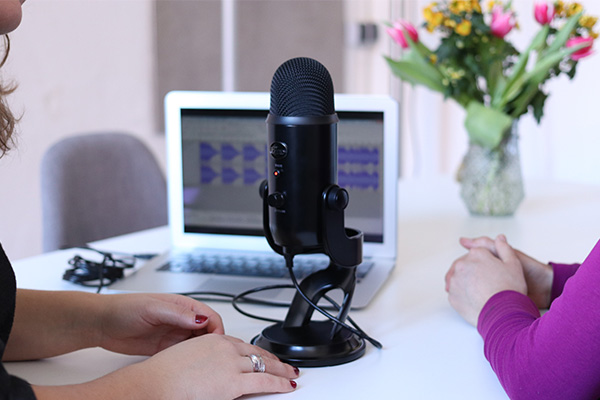
Real Estate Syndicator: The reason why people go on podcasts is to have people reach out to them.
What a great reminder. People don’t come to my show because they like having conversations with me.
I do.
There are a lot of people with whom we become friends because of this show. We’re like, “That was a great conversation,” and we stay in touch, like us. Some people do come back because they want to talk to me and I want to talk to them. The reality is that the reason that people come on these shows is that they want you to reach out to them. You’re not imposing by emailing them, calling them or telling them you’re interested. Even if you decide at that moment that it’s not the right time to invest with them, they are happy for the opportunity to have the conversation. I had a conversation with another friend of mine, Maureen McCann. Do you know Maureen?
I know of her.
She’s a turnkey person. She’s been on this show about five times. We did a whole session because she talks about 52% returns and some cool stuff.
That’s how we got into multifamily. It was turnkey. That is a whole other story.
At one point, I was calling her and was like, “Are you seeing results? Are my ladies calling you?” I trust her so much. I was like, “I want my ladies to connect with her because she would educate them.” She’s a lot like you in that way. She’s education first. She said, “Don’t be so concerned with what I’m getting out of this show. The reality is as I build these relationships, it may be ten years down the line when someone finally thinks, “I’m ready for that.” I loved that Maureen supported me in this way. Maybe I’ll connect with her again.
You don’t have to invest right away. Don’t feel any pressure that if you’re calling somebody that it’s like, “I feel committed, obligated and all of that stuff.” They would hope that if you connect with them that you would consider them when you’re investing but it’s not an obligatory thing. You get to ask questions. They’re in the business and on this show because they want to connect with you. That means emails and phone calls. All of those things are good. They’re not just okay. They’re good. You are not imposing yourself on them by making those connections.
If this is on video, I’m bouncing on my seat. I’m so excited because what your friend Maureen said is so true. I want to have a conversation with you not just for the now. If it’s for the now, then that is great but I’m talking future. The shortest time we’ve had an investment was 18 months to 7 years. Our investments are long-term investments and so are my relationships. I want them to be long-term. Since our investments are so long-term, I want to have a relationship with you. I need to because we’re going to be in this for the long run.
You are going to be a passive investor but it doesn’t stop there. You don’t get the mailbox money or you do but I expect you as one of my passive investors to read my emails. I want you to know what’s happening. I want you to be educated on what’s happening within the market. I want you to know all the things that I know and everything that I’m sharing with you.
If you go onto my website, you’re going to get my information on how to invest. We call it Becoming Independently Wealthy With Apartment Buildings. It is a very long title. I might shorten it. That’s going to be some emails that you’re going to get and some more education coming from myself and my husband. The great thing is you’re going to be invited to go into my investor portal. You have no obligation to do so but that’s more information. You get to see what an investor portal looks like. You’ll get to schedule a 50-minute call with me.
This is usually what scares people the most and why they don’t call. It is because you think when I pick up the phone, I’m going to be like, “Give me your money.” If I even talk about money, it’s probably going to be because you mentioned it first. I don’t want to know about money. I don’t even want to know how much money you make. I want to know you because I don’t know what’s going to happen for you and with you tomorrow, 5 years from now or 10 years from now when something good happens or if you have something great financially happen to you or you get into a new job and grow.
I’m working with someone who has $10,000 in savings sitting there. He’s growing his wealth. I’m working with him and helping him to grow that financial stability. I help him create a budget and create a system or a foundation. I give him books to read to grow from. I still want to know him 10 or 20 years from now when he’s invested in syndications and invested in other investments to create legacy wealth. I want to have these legacy relationships. It’s not a one-time phone call. This is me wanting to get to know you. I will never ever talk money unless you want to.
I have one other question and I’ve never asked a syndicator this. Let’s talk a little bit about exits. When you’re in syndications, some of the things that happen is they have this plan. They’re going to do a value add, a new build or whatever it is. They give you all the numbers of what this is going to work out and then what are they going to rent it at.
If they’re doing a value add, they’re having to cycle people out as leases come up. There’s a whole process. They’ll say, “When the project is done, we’ll refinance it. We’ll pay off your thing. You make a certain amount of money. Either you’ll make income on the rents over the long-term or if or when we sell it, then you make that capital.” There are lots of different ways that you earn money, which is how they come up with their final IRR, Internal Rate Revenue.
These are the exit strategies or the possible exit strategies that we hear a lot about. What if things go bad? Let’s talk a little bit about how that works. One of the things that I want to preface this with is one of the things that I know. If you’re with a good syndicator with a good project in a good location, as long as you can get the time to be right, the project will recover even through a bad time or a slump. You have to be okay with, “The timeline on this project is 2 to 7 years.”
Maybe they said 2 years, 3 years or 5 years. You got to understand that their biggest obligation to you is to make money for you. If that means that it’s going to take a little bit longer than the 2 years, 5 years or whatever it is, then sometimes, they need to do that to hold it long enough so that they don’t see a loss.
You’re still going to make money on the rent but it may not be the payoff as fast as you would want. That’s the one thing that I have always had in the back of my mind when I go into syndication. This is what we’re shooting for. It’s not the best case. It’s also not the worst case. It’s to allow for the time to be right. I’d like you to talk about the way that you look at exits and what happens if things go bad.
It all starts with underwriting. You already said it too. It’s best case, worst case and base case. The numbers that we put out to our investors are usually very much the base case. We normally don’t even put out the best-case scenario because we never want to overpromise. There are ways that we can make more money on the property. There are ways that we know how to advance the property further than how we put it out there. We normally don’t put it all out there because a lot of the time, when we exit a property, we still want to leave meat on the bone for the next owner. We can take it to those places.
What happens when a property goes sour? This hasn’t happened to us yet. It goes back to underwriting. You have to make sure that the numbers are solid. There are a lot of things that we can’t control but we want to control them as much as possible. You said our number one goal is to make money for our investors. That is true but there are numbers 1.2 and 1.3.
Our other goal is to make the best place possible for our tenants to live. I know that has nothing to do with your question but we are education first and tenant first. If we have happy tenants in a good community, then our investors thrive too. If our tenants are thriving, our investors are thriving. Number three is communication. A syndicator needs to communicate with you when things are going bad and good so that when things are starting to go south, it’s not a surprise. This is why multifamily is such a great investment. It’s a span of 2, 5 or 7.
If we have happy tenants in a good community, then our investors thrive, too. If our tenants are thriving, our investors are thriving. Share on XI used to tell people we stop at 7 but we do underwrite for 10 years. This is why multifamily is such a great asset. It is because it’s supposed to stand the test of time. Maybe rents go down. Maybe we have a fire. Maybe something happens that is out of our control. That’s key. When something like that happens, that’s why we’re given this time to figure it out and bring it back up. We figure out how to rectify the situation and bring it back out but it’s those things that we can’t control.
It is the things that we can control that you want to make sure that the syndicator has a handle on. They can control the numbers that they enter into their property. That’s why we underwrite and keep on underwriting. That’s why we do worst case, best case and base case because we want to make sure that we are not surprised by the numbers.
If the worst-case situation should happen, we want to already know ahead of it. If we get the best case, that’s great. We already know ahead of it. We want to make sure we have a handle on all of these things. It’s your property management team. We do not actively property manage the asset. We manage the property managers. We are the asset managers. We look over everything and make sure everything works.
You want to make sure that you know who the asset manager is on the syndication. Don’t just invest or talk to the syndicator. The asset manager is your key person on the deal. You want to make sure you have his number if something goes wrong. You want to make sure that you know that he or she is doing the right thing. That is the person that is the puppeteer for the entire deal.
Once you go through acquisitions, you have people that come in. Maybe they’re part of the asset management team or acquisitions. Maybe they helped underwrite. Maybe they did due diligence on the deal. These are various ways you can get into a deal and they brought capital to a deal. Whoever is the asset manager, once the acquisition happens and the sale happens, that person or that team takes it over. That is the person or team that is making you money.
Is that you with your projects?
That’s me and my husband. My husband is the key asset manager in our team.
You are the asset manager as well as the syndicator. Is that true?
Yes. Syndication 101 is the pooling of investors’ funds. I am a syndicator because that is what I’m doing within the asset. That is how I’m funding the asset. It’s with the syndication. The asset manager is part of the syndication. He or she isn’t even part of the syndication. She’s part of the business plan. When you take over a multifamily building, you’re creating a business. It’s business within itself.
The main manager is the asset manager. That is your key person. That is the person you want to talk to. This is the person that you want to make sure you know, like and trust with your $50,000, $500,000 or whatever it is because this is the person that’s going to be managing those funds and all the other managers.

Real Estate Syndicator: The asset manager is your key person. That is the person you want to talk to. This is the person that you want to make sure you know, like, and trust with your funds.
I hadn’t heard that distinction before so thank you.
You’re welcome. There are two ways I could take this conversation. One of the reasons why you might not hear that term before is that a lot of syndicators out there don’t do the asset management part. They raise the funds. They’re part of the business plan but they don’t have the decision-making. You want to make sure that you know the prime decision-makers in the deal.
When a deal goes sour and I’ve heard of a few, all I can say is the things that go wrong are usually because they didn’t have their numbers right in the beginning and they weren’t communicating with everyone. There’s that saying, “Do and ask forgiveness later.” It’s the opposite with syndication. You want to make sure that the people that you are working with because limited partners are still partners. They know what’s happening with their money and what’s happening with the asset in good times and in bad.
I haven’t heard of anything that’s fallen apart but those that I have heard that have gone slightly more toward the sour end could be solved with communication and making sure that you have your numbers right from the beginning. That’s why each building that we’ve gone into has had its business plan. We follow that business plan and pivot when needed. That’s why we’ve had ten successful exits. It is because we have a foundation of education of people first that the numbers have to work. That’s always the caveat. We invest in people but the numbers have to work. We run the numbers religiously. We keep on running the numbers inside of the deal because markets fluctuate.
Pandemics happen.
Craziness happens. The thing is multifamily has pulled through the entire time. Will it go down? Will it go up? I don’t have a crystal ball. That’s why education is necessary so that if you are investing your $50,000 into, let’s say, syndication, you know that that money has the possibility of making money but also has the possibility of not. One of our biggest concerns is the return on capital. We want to make sure that we make money on your money but we want to also make sure we return that capital. You don’t want to lose money. That should be the number one rule in syndication school.
You don't want to lose money. That should be the number one rule in syndication school. Share on XOne of the things you said also highlights the value I have when looking at a syndicator. Do they have mentors themselves? Your syndicator has the experience and work ethic. They’ve got all their resources. One of those things that are going to ensure success is that they’ve got people that they can go to when they have a question because they’re at their level. Maybe they’ve been in it for 5 years, 10 years or 20 years. Other syndicators have been in there longer. There are always new adventures that happen in real estate. Hopefully, it’s not too many adventures. You don’t like adventures in real estate but they happen.
They do happen even though you don’t want them to.
That’s right. We don’t want adventurous investing. It’s good to have people that you can go to. You’re going to the syndicator and the syndicator should have someone to go to that has been through the cycles that can then mentor them if they hit bumps in the road.
We have our mentors. We also have a group. Within 7 Figure Multifamily, this came out of a group that I was originally with, 7 Figure Flipping. Those were my mentors in the flipping and wholesaling industry. When Jason and I broke off and did multifamily, I kept in contact with those mentors. Every so often, I would let them know about a deal that I had. I would let them know, “We should partner up.” Jason and I had already created our mentorship program at that time but I saw this way to uplift everyone.
The great thing is having this amazing relationship not only with my mentors in multifamily but I get to also watch and be a part of this family within 7 Figures and get to ask them questions. They’re other investors who either have gone through the things that I’m going through or are going through it. I can talk with them and learn from them.
It’s also learning from your peers, not only from those that have come before you but from those who are going through it. They might have answers to the questions that you don’t know even to ask. That’s what good mentorship provides for you. It provides someone to go to whom you can ask them any question and they will answer with no ifs and buts because they’re there for you. They’re there to mentor you and help guide you as you step up into your future.
As always, we could talk forever but I want to be respectful of your time. Before we end this show, could you tell everybody how they can reach you? Ladies, take notes.
The best place to get to go to is my website, www.YarusiHoldings.com. It’s easy. When you open up the email, there’s going to be a button you can click to get more educated. You can click on the button and learn more about me and my team.
She’s also got that free report there for you. You can download that to get a little bit more education. This conversation has, as always with you, been so yummy. Thank you.
This has been amazing. It was great to catch up. I cannot wait to have you on my podcast. We will extend this conversation into more of what you’re doing.
That sounds awesome. Thank you so much. Ladies, thank you so much for joining Pili and me for this show. Wasn’t it awesome? I love it when you get to overhear a couple of girls chatting. It’s so important to me that you feel comfortable and blissful in making your choices. That’s what this show is all about. I feel like Pili modeled that in so many ways. Thank you for joining the two of us. Until then, remember, goals without action are just dreams, so get out there, take mindful action, and create the life that your heart most deeply desires. I’ll talk to you soon. Bye.
Important Links
- Yarusi Holdings LLC
- Multifamily Live
- The Jason and Pili Project – Instagram
- Last Episode – Create a Strong Foundation with Pilialoha “Pili” Yarusi
- 7 Figure Multifamily
- 12 Week Year
- Miracle Morning
About Pili Yarusi
 Pili Yarusi loves to help people and “Lead with Aloha”.
Pili Yarusi loves to help people and “Lead with Aloha”.
She is a founder and Investor Education and Relations Director for Yarusi Holdings, a multifamily investment firm that has acquired over 2000 units valued at $180 Million since 2016. The firm repositions properties through operational efficiencies, moderate to extensive renovations, and complete rebranding.
Pili is a co-founder and coach at 7 Figure Multifamily – focusing on Real Estate Syndication and Multifamily Investing and trains others on the success formula for buying apartment buildings at www.7FigureMultifamily.com.
Pili is a co-host of The Multifamily Live Podcast providing actionable content and tools to build and strengthen your multifamily business.
She is also the co-host of The Jason and Pili Guide to Real Estate Investing – a fun and interactive YouTube channel that features all the great things that she and Jason are working on.
She and her husband Jason have three awesome children, Luke, Lily, and Leo, and an English Bulldog, Jill.
——————————————————
To listen to the EXTRA portion of this show go to RealEstateInvestingForWomenExtra.com
Learn how to create a consistent income stream by only working 5 hours a month the Blissful Investor Way.
Grab my FREE guide at http://www.BlissfulInvestor.com
Moneeka Sawyer is often described as one of the most blissful people you will ever meet. She has been investing in Real Estate for over 20 years, so has been through all the different cycles of the market. Still, she has turned $10,000 into over $5,000,000, working only 5-10 hours per MONTH with very little stress.
While building her multi-million dollar business, she has traveled to over 55 countries, dances every single day, supports causes that are important to her, and spends lots of time with her husband of over 20 years.
She is the international best-selling author of the multiple award-winning books “Choose Bliss: The Power and Practice of Joy and Contentment” and “Real Estate Investing for Women: Expert Conversations to Increase Wealth and Happiness the Blissful Way.”
Moneeka has been featured on stages including Carnegie Hall and Nasdaq, radio, podcasts such as Achieve Your Goals with Hal Elrod, and TV stations including ABC, CBS, FOX, and the CW, impacting over 150 million people.










